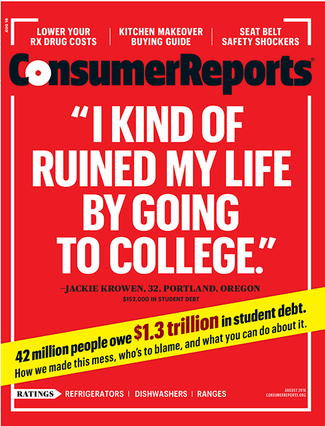 As a former high school drop out, it is not my place to say that getting a degree is a bad idea. However, it is clear that education is changing fast and that the cost:value ratio of traditional post-secondary institutions is becoming more of a burden than an asset for many students. Technology, industry and economic shifts are developing so fast that a 4-year program is sometimes obsolete by the time you graduate. The skills that seem to be valued in the current job market are adaptability, life-long learning, working with others, project management, entrepreneurial skills, value creation (rather than getting paid to 'show up'), problem solving, social influence and so on. It is a dynamic work-scape out there, with few guarantees or long term commitments on both sides of the employer/employee divide. I'm definitely not an expert on any of these issues. And there is no question that some types of post-secondary training can lead to higher paying work. Having a basic high-school education these days doesn't open a lot of career doors. I just thought it would be practical to think about whether starting a painting business is a viable option for a young person, as opposed to pursuing 'higher education'. The cover story on the August 2016 issue of Consumer Reports stated that 42 million people owe $1,300,000,000,000 in student debt. While many countries around the world offer free education, in North America adult students are drowning in deep pools of debt. Is it a wise investment? Jackie Crowen, aged 32, from Portland Oregon, with $152,000 in student debt is quoted as saying "I kind of ruined my life by going to college." Let's play with some numbers... If she attended school for 10 years, that is an average of $15,000/year in debt. If she had worked instead of attending school during those years, lets assume she could have earned an extra $15,000/year in earnings. That is $300,000 over 10 years that she is behind someone who didn't attend school and started painting full time, earning $30,000/year. How many years will it take her to catch up? If she gets a job paying 50% more because of her education, it would take 20 years! But that is assuming she doesn't end up working at Starbucks, as many highly educated people do. You sometimes end up over-qualified for entry-level professional jobs while lacking experience required for middle-tier professional positions. And that is assuming her skills and education are even still relevant after all that. Now there are other factors to consider... Someone with 10 years experience in a field like painting can usually increase their earning power, especially if they run their own business. This is an advantage over someone just starting their careers. Also, developing a good work ethic, serving customers and learning hard skills like painting can serve you well for the rest of your life. You can always feed and house yourself with these skills. You can take them anywhere, as painting is needed all over the world. The trade is not in danger of becoming obsolete anytime soon. Learning entrepreneurial and business skills are highly valuable and transferable to countless other fields. Being a hardworking self-starter is a huge competitive advantage. Running a business is a tremendous kinetic educational experience. Another benefit to becoming an entrepreneur over getting an institutional education is that it re-programs your brain to create your own opportunities in life, rather than waiting for the gatekeepers to accept you and funnel you into pre-packaged opportunities. Consider too what your quality of life is like as a student, sacrificing financially and cramming your schedule full while enduring the stress of working, studying, attending class, sinking in debt and facing an uncertain future. That is a lot to deal with for years on end. Starting a business doesn't guarantee that you will become more educated or more successful, but you will learn a lot through the process and you can always upgrade your skills on the side as required. There are many ways to do this. The cost and risk of spending your 20's in school is high enough to seriously consider the alternatives. Starting a simple service or contracting business is one worthwhile option. 4 Brilliant Reasons To Not Go To College The $100 Start-Up The One Year Alternative Graduate School Program Creative Live Mark Cuban on The Start Of The College Implosion? The Yachtless 17 Ideas For The Modern World Of Work 6 Career Moves Smarter Than An MBA CBC - Is A University Degree A Waste Of Money? CBC - Why Some PhD's Are Quitting Academia For Unconventional Jobs
0 Comments
Your comment will be posted after it is approved.
Leave a Reply. |
Categories
All
Archives
March 2021
|
